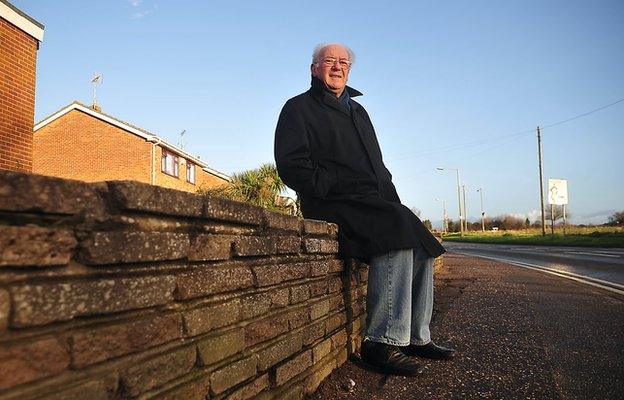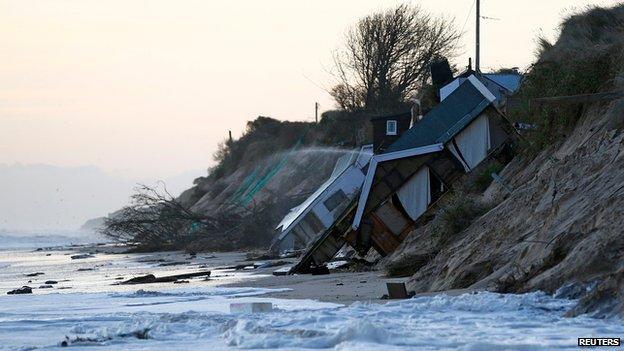How will the 2013 floods be remembered?
- Published

In 1953, Harry Francis had to be rescued from a loft. In 2013, he lost his beach hut in Walton on the Naze
Sixty years separate the North Sea floods of 1953 from last week's tidal surge. The fact the latter fell on the 60th anniversary of the former is an irony not lost on survivors. But how will the 2013 floods be remembered?
It was the tidal surge labelled the "worst in 60 years".
The flooding last week hit at least 1,400 homes and some areas witnessed the type of weather conditions expected every once in 500 years.
Particularly badly hit were Lincolnshire and Norfolk.
For those affected, last week's floods will be forever remembered.
But the surge of 60 years ago claimed hundreds of lives as it destroyed villages and parts of towns across the English coast.
For those who experienced the 1953 North Sea floods first hand, last week's surge will be remembered - despite the damage and devastation caused to many - as the year the East Coast was "extremely lucky".
One of them is Harry Francis. He was affected last week too - his beach hut in Walton on the Naze was ruined by the surge.
Mr Francis's memory of the 1953 floods in Jaywick, Essex, begins with his arm falling out of bed into freezing cold water.
Then he remembers being told to get up and get dressed.
The bungalow started to move. His father opened the front door, then went to the back of of their home and kicked a hole in it.
Although this stopped their home from rocking it meant the water level went from 3ft (1m) to 5ft (1.5m).
His parents then smashed a hole in the ceiling and got the family into the loft space.
"That's when we realised how bad it was," Mr Francis said.
"The water was only a couple of inches below the ceiling. We all just sat on rafters.
"Out of the back of our bungalow we were calling to a family and this family were calling back to us.

Seven cliff-top homes collapsed last week in Hemsby, Norfolk
"And then they stopped calling and we thought they had been rescued.
"But they hadn't. They had all drowned."
Painful memories of that night were brought back last week.
"It is extremely lucky that Jaywick didn't get hit again," Mr Francis added.
"The waves were large but all the sea defences worked.
"The force of the sea is frightening. This time it was different. In 1953 there were no communications, nobody knew anything, nobody was told anything and hardly anybody had televisions.
"Even the policeman had to walk all along the front to let people know to get out.
"This time, the communications were excellent. People knew what to expect and there was plenty of warning and the plans were in place."
Dominic Reeve, professor of coastal engineering at Swansea University, said: "I was looking back at the records for the same sort of event which happened in the 1950s.
"It is testament to the research and design and the effort that has gone into our coastal defences that we didn't see something similar this time around.
"I think we've got a lot more in the way of early warning systems in terms of defences which have prevented the sort of scale of devastation we saw in 1953.
"Defences against the elements are always a balance of costs against the consequences - and that's a decision that has to be made by society as a whole."
- Published6 December 2013
- Published5 December 2013
- Published31 January 2013
- Published30 January 2013